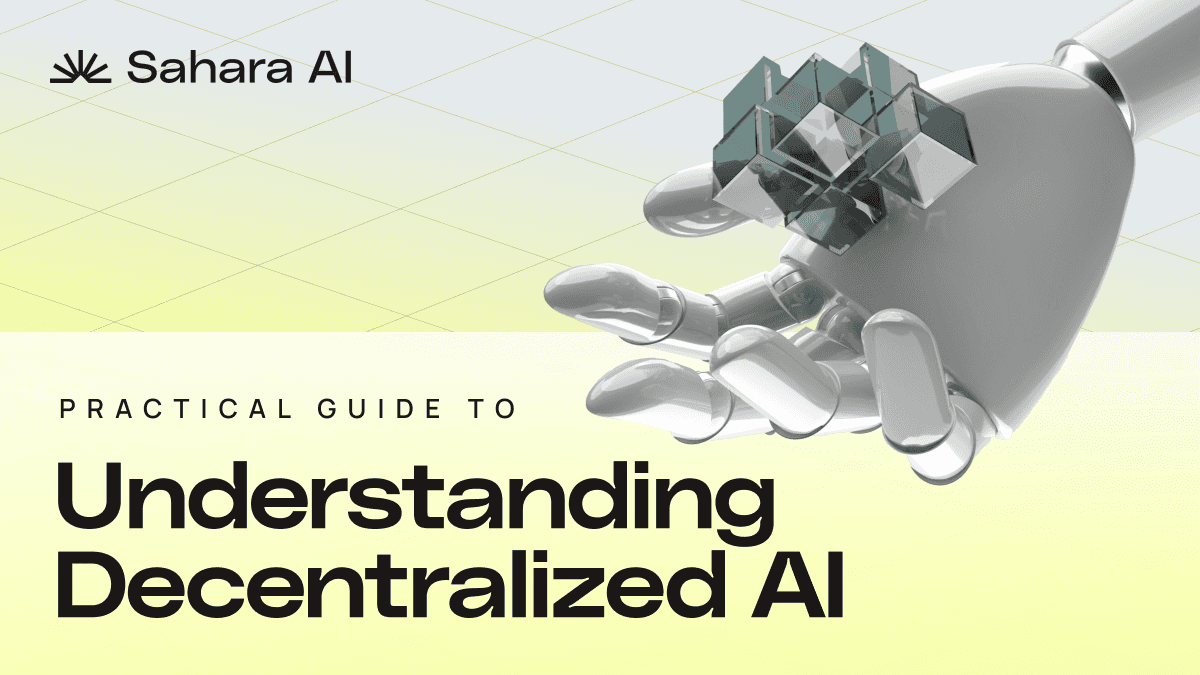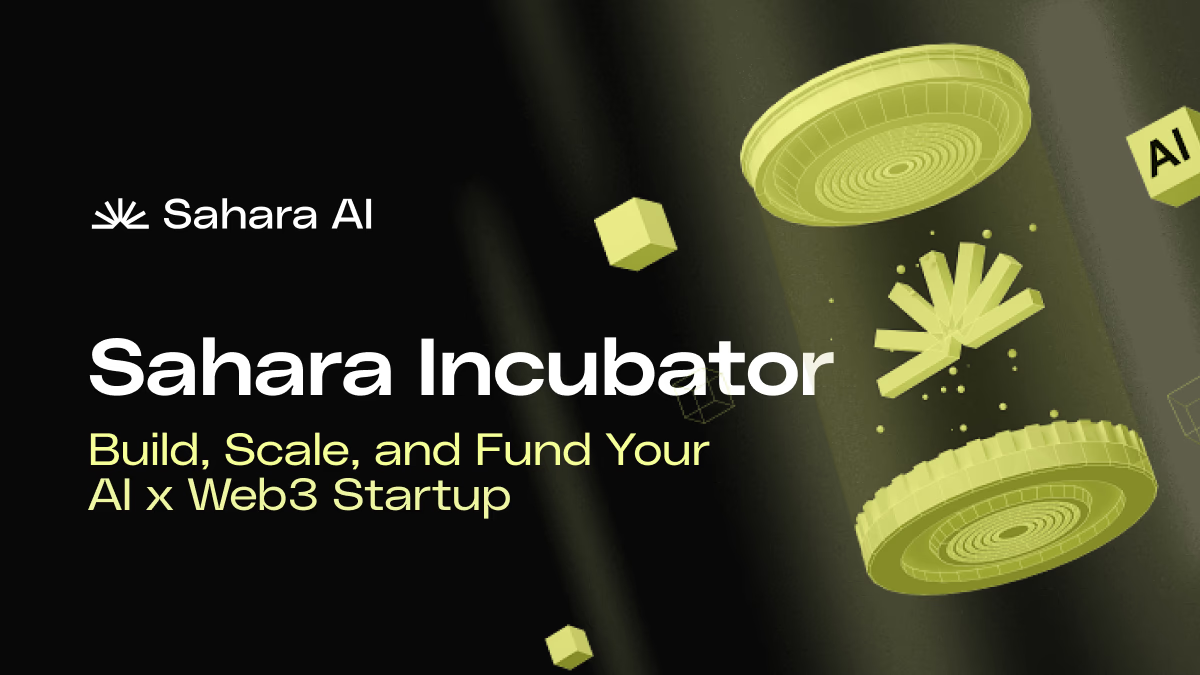Understanding Decentralized AI: A Practical Guide to the Intersection of AI and Blockchain Technology
Nov 25, 2024
In the last year alone, artificial intelligence (AI) has quickly become integral to every aspect of our lives, transforming how we interact with technology on a personal and professional level. From the algorithms that power our daily applications to the systems that drive enterprise decision-making, AI's unprecedented ability to elevate human potential has made it the cornerstone of modern innovation. Much of this progress has been made possible by large, centralized AI systems, which have driven advancements in scale, capability, and accessibility. However, this centralized approach also comes with inherent trade-offs, limiting access, transparency, and innovation for the broader community.
Decentralized AI (DeAI) offers a complementary path forward—one that builds on these advancements while addressing the limitations of centralized systems. DeAI introduces capabilities that traditional systems are inherently unable to provide, such as:
transparent attribution across the AI lifecycle;
true ownership and control over your AI assets, such as proprietary data and models;
and novel forms of monetization for all contributors.
In this guide, we'll explore the current limitations of centralized AI, reveal how decentralized systems overcome these challenges, and show how this technology is creating new opportunities for everyone involved in AI development and use.
The Limitations of Existing AI Systems
Existing, centralized AI systems have been instrumental in making artificial intelligence as ubiquitous and impactful as it is today. Large, centralized players have driven the development of sophisticated models, enabled large-scale applications leveraging massive user data, and turned AI into a transformative force across industries. Without these advancements, AI would not have the reach, scale, or capabilities it offers today. However, the centralized nature of these systems also perpetuate inherent limitations that restrict transparency, control, and accessibility—challenges that decentralized AI aims to solve.
These fall into the following key areas:
Resource Barriers that Limit Innovation: Building and operating advanced AI systems require significant computational resources, access to quality data and models, and comprehensive tools, which are typically most accessible only to the largest organizations. This concentration of resources restricts innovation to a select few and leaves smaller developers and businesses unable to compete or meaningfully contribute to the AI ecosystem at scale.
Opaque “Black Box” Models that Undermine Trust: Centralized AI systems often function as “black boxes,” where it’s difficult or impossible to see how decisions are made or what data informs them. This lack of visibility creates trust issues, particularly for data providers that need to ensure their intellectual property isn’t being mishandled, and for businesses and end-users who need to understand whether models are fair, unbiased, and reliable.
Data Practices that Erode Privacy and Control: Many of today’s larger AI systems rely heavily on both scraped public data and private user data, often collected at scale without clear consent or equitable compensation. While this data is crucial for training powerful models, it consolidates control within a few large entities, limiting the ability of individuals to manage or benefit from the use of their own information. This raises important questions about ownership, agency, and fairness in the AI-driven economy.
Limited Monetization Opportunities that Hinder Growth: Model developers often face significant challenges in turning their innovations into sustainable revenue streams. Traditional capital markets tend to favor developers with connections to established tech backgrounds, leaving others with fewer pathways to monetize their work. While existing monetization methods like licensing agreements or pay-per-use can provide early revenue, they are often hampered by complex negotiations, reliance on intermediaries, and a lack of automation—making it difficult for developers to scale efficiently.
While centralized AI systems have laid the groundwork for much of today’s progress, decentralized AI represents the next step forward by addressing these limitations and paving the way for a more inclusive and equitable future in AI development.
The Benefits of Decentralized AI
Decentralized AI is an approach to artificial intelligence that leverages blockchain technology to enable greater control over AI assets, enhanced transparency while preserving privacy, and introduces novel monetization methods for all participants across the AI lifecycle—from AI enthusiasts to AI developers or even enterprises. In Decentralized AI, anyone can contribute to and benefit from AI equitably.
The integration of blockchain technology with AI unlocks powerful new capabilities that aren’t possible with today’s traditional, centralized AI systems, including:
Transparent Authentication and Attribution Throughout the AI Lifecycle
Decentralized AI systems enable transparent attribution throughout the AI lifecycle. Ensuring that the origins, ownership, and histories of AI assets (i.e. anytime a dataset or model is developed, modified, or deployed, etc) are fully traceable fosters trust and accountability. Integrating blockchain technology with AI allows stakeholders to verify sources, track usage, and assess the quality of AI assets without needing to go through centralized third-parties.
Additionally, as new AI regulations emerge, especially around disclosing asset sources—such as California's recent requirements for training data documentation—these practices are becoming increasingly essential.
Benefits:
Real Accountability: Clear, verifiable histories of how AI models are built and trained, allowing you to prove every step from data collection to deployment.
Model Integrity: A permanent, tamper-proof record of your model's development ensures users can trust its outputs and verify how it was trained.
Regulatory Compliance: Development history is automatically recorded on the blockchain—an unalterable digital ledger that provides verifiable records of model development and training.
Control Over Your AI Assets
Decentralized AI gives developers the ability to retain verifiable ownership of their assets—whether that’s data or models—while still enabling secure, transparent collaboration.
In traditional AI systems, developers often lose control in two ways: 1) by depending on large, centralized platforms, where these companies set the terms of use and ownership; and 2) by open-sourcing their models and datasets, which can increase visibility but limits control over how these assets are reused and credited.
Decentralized AI brings control back to developers, giving them a verifiable way to prove that they are the creator of an asset, and the ability to choose how their asset is shared, used, or monetized. This protects IP while still fostering secure collaboration.
Benefits:
Verifiable Ownership: Prove you created an AI model or dataset with cryptographic certainty, protecting your intellectual property.
Usage Tracking: See how your models are being used across the ecosystem and by whom.
Composable Rights: Define clear terms for how others can build upon or integrate your AI assets, enabling secure collaboration while maintaining attribution.
Unlocking New Monetization Opportunities in AI
Decentralized AI is transforming how contributors—whether they provide data, models, or computing power—can earn in the greater AI ecosystem. Unlike centralized AI platforms, which often hold all the power and dictate how contributors are compensated, decentralized AI shifts the balance. It ensures contributors maintain control, are paid transparently with fair attribution, and gain access to new monetization channels.
By integrating blockchain technology with AI we are able to create a more open and collaborative ecosystem. Whether you’re a developer building AI assets, an individual offering proprietary data, or an enterprise providing resources, decentralized AI is redefining how value is created and shared—empowering everyone to thrive.
Benefits:
Unlock New Value Through On-Chain Tokenization: Tokenize your model or dataset into on-chain digital shares and open the door to innovative new financial opportunities. This enables you to secure resources faster, scale development, and accelerate growth in ways that were previously inaccessible.
Direct Revenue Opportunities: Earn income through traditional methods, such as licensing or pay-per-use fees, while using blockchain to remove intermediaries and gain direct access to your users and partners. Decentralized AI simplifies processes, enabling faster, more secure, and flexible ways to monetize your assets.
Fair and Transparent Payments: Blockchain enhances existing revenue-sharing models by using automated smart contracts to ensure instant, tamper-proof, and transparent payments whenever your data, models, or compute resources are used—eliminating intermediaries and delays.
Broadening Participation in AI Development: Financial incentives attract a broad range of contributors, enriching the AI ecosystem and ensuring that the benefits of AI development are shared across a wide spectrum of users.
By leveraging blockchain, decentralized AI not only improves existing monetization mechanisms but also introduces tools that make them more accessible, transparent, and efficient. This empowers contributors of all sizes to unlock the full value of their work in a collaborative ecosystem.
Using Blockchain to Support AI
Blockchain technology is essential to decentralized AI, providing secure, transparent infrastructure for managing ownership, tracking contributions, and ensuring fair compensation across AI assets. Unlike centralized systems, a blockchain’s immutable ledger offers verifiable proof of ownership and attribution, fostering trust and accountability throughout the AI lifecycle.
Smart contracts are used to automate compensation, ensuring contributors receive fair rewards without reliance on central authorities. This enables a diverse range of participants—from individual developers to small businesses—to engage meaningfully and benefit financially.
While many traditional AI developers and end users may be unfamiliar with blockchain technology and web3, today’s decentralized systems are increasingly designed to hide these complexities, allowing everyone to enjoy blockchain’s benefits—security, transparency, and trust—without requiring deep, technical blockchain knowledge.
In this way, blockchain serves as an invisible framework that upholds the integrity of decentralized AI, creating an accessible, collaborative environment where contributors of all sizes can participate and benefit equally.
Join the Decentralized AI Revolution
The rise of decentralized AI represents more than just a technological shift—it's a fundamental reimagining of how AI development can work. By combining blockchain's transparency and trust with AI's transformative power, we're creating an ecosystem where innovation isn't limited by centralized control, where contributions are fairly rewarded, and where the benefits of AI advancement are shared across the community.
Interested in exploring decentralized AI further? Join the movement toward a transparent and inclusive AI future. Whether you're a developer building AI assets, a business looking to use them, or simply just AI-curious, this is your chance to help shape a more equitable AI ecosystem. Join our waitlist here!




